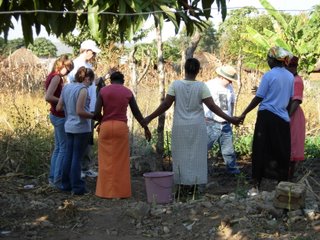Never Ending Gardens - Does it Work?
 The purpose for planting Never Ending Gardens is to create self sustainable food security within a family unit. Family units might not consist of a mother, father, and children, but instead it might be a "go-go" (grandmother) and several children. We define a family unit as 8 people living together. The Never Ending Gardens plan is to provide self sustaining food within 18 weeks, and we have proven this can be accomplished in 3 stages.
The purpose for planting Never Ending Gardens is to create self sustainable food security within a family unit. Family units might not consist of a mother, father, and children, but instead it might be a "go-go" (grandmother) and several children. We define a family unit as 8 people living together. The Never Ending Gardens plan is to provide self sustaining food within 18 weeks, and we have proven this can be accomplished in 3 stages.In May 2006, Heart for Africa began the process of implementing Never Ending Gardens in 726 family units in the Hereford region of Swaziland. This is 95% of the homes in this region. Much work has gone into this accomplishment. This work was undertaken by the Swazi people working alongside hundreds and hundreds of North American brothers and sisters. Much more than seedlings have been planted in Swaziland.
The Never Ending Garden plan is accomplished in 3 stages.
- Stage 1 requires that the Swazi family unit put posts in the ground to support fencing that will go around their future garden. (Both posts and fencing supplies are provided through donations from Heart for Africa supporters.) We then assist them through team work in planting seedlings in 1/3 of their new garden giving them instruction on watering and caring for the young plants. They are then given instructions to build compost trenches in the remaining 2/3 of the garden. (Trench gardening will produce much healthier, hardier plants.)
- Stage 2 takes place 6-8 weeks later.Here we return to their gardens to install drip irrigation systems as long as they have done their part in caring for existing plants and creating the needed compost trenches. Family units are taught to leaf pick mature plants, leaving the healthy plant to continue to grow. In this way one plant can continue to produce food security for weeks. New seedlings and seeds are planted in the newly formed trenches, and some mature plants are marked to be left to mature and go into seed producing plants.
- Stage 3 takes place 10 - 12 weeks later giving time for plants to mature. During this time the family continues to be able to eat immune boosting vegetables while also preparing for future planting. During stage 3 they learn how to harvest seeds from mature plants, and continue planting in areas of the garden that are now ready for new seedlings. The drip irrigation system is monitored to be sure it is still working properly and repairs are made if needed. Families are given seed packets as well.
- Follow up for each garden is done every month for the next year by the Ministry of Agriculture of Swaziland or Heart for Africa staff. New seeds will be given throughout this time. At the end of this 2 year process, family units are now prepared and educated to continue growing plants to both eat and to produce seeds for the future.
Heart for Africa has commissioned a thorough study to follow up on the long term effectiveness of the Never Ending Gardens project in Hereford. This study is now being conducted by the Minister of Health and Social Welfare in Swaziland. The results of this study will be of great interest to our organization, other non-profit organizations, and the Ministry of Health in Swaziland. If successful it will offer much hope for other areas of not only Swaziland, but for all of sub-saharan Africa. We all anxiously await the results.
Never Ending Gardens is not an effort to simply "give" food to those who are hungry. Never Ending Gardens works to assist and enable them to plant, grow, and produce food for themselves. It takes a great deal of organization, patience, prayer, and hard work. We are eternally grateful to the hundreds of individuals who traveled to the Herefords region with us, to work alongside the people there to enable them to produce their own food.
May God bless the plants, the people, and the results of the study currently underway.


 There is great excitement and hope flowing in the village of Deya outside of Lilongwe, Malawi these days. Through the generous donation of a Heart for Africa volunteer the first block of a school is under construction and will welcome 120 children in 1st and 2nd grade! The next two blocks will be built once an additional $44,000 is raised. There is now hope for the future of this village where up until last year had no source of clean drinking water until a team from the Heart for Africa raised funds to install the first and only bore hole (well) in the area. This well now provides clean drinking water for the entire village.
There is great excitement and hope flowing in the village of Deya outside of Lilongwe, Malawi these days. Through the generous donation of a Heart for Africa volunteer the first block of a school is under construction and will welcome 120 children in 1st and 2nd grade! The next two blocks will be built once an additional $44,000 is raised. There is now hope for the future of this village where up until last year had no source of clean drinking water until a team from the Heart for Africa raised funds to install the first and only bore hole (well) in the area. This well now provides clean drinking water for the entire village.